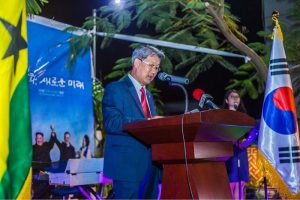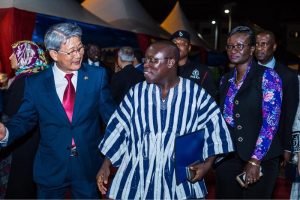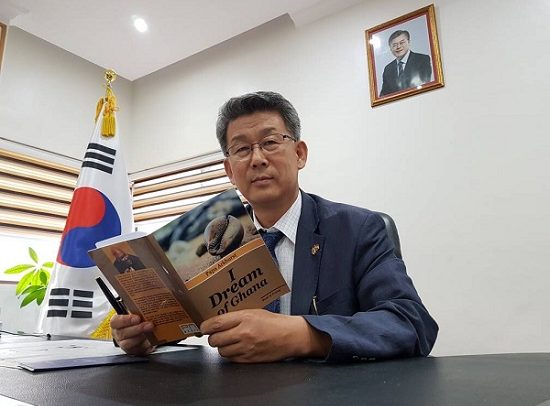Ambassador Kim Sungsoo
DAILY GUIDE has an exclusive interview with HE Kim Sungsoo, Ambassador of the Republic of Korea to Ghana
DAILY GUIDE has an exclusive interview with HE Kim Sungsoo, Ambassador of the Republic of Korea to Ghana.
Can you introduce the Republic of Korea to us?
The Republic of Korea is an exceptional example of an aid recipient turned a high income earning country whose gross national income (GNI) per capita increased rapidly in the early 1950s from US$67 right after the Korean War (1950-1953) and colonial period by Japan (1910-1945) to US$28,380 in 2017.
The Republic of Korea is now the world’s 12th largest economy, making it an important player in the international stage. It is the first former aid recipient country to become a member of the Development Assistance Committee (DAC) of the Organisation for Economic Cooperation and Development (OECD). Korea also took the chairmanship of the G20 Summit in 2010.
The Republic of Korea has a long history of 5,000 years ago with a prestigious culture and unique writing system which is different from Chinese and Japanese. We celebrate the 3rd of October as our National Foundation Day which marks the historic founding of the first Korean Kingdom in 2,333 B.C by our forefather Dangun. Our alphabet, known as Hangeul, was created in the 15th century and is considered to be the most scientific writing system in the world because it is easy to learn and write and this has greatly contributed to Korea’s high literacy rate, (which is 99%) and advanced publication industry as well.
In terms of culture, recently there has been growing interest in Korean pop music, TV drama series and movies in Africa, America, Asia, Europe and Middle East. For instance, the Korean drama series, ‘The Innocent Man’ and ‘Dream High’ were broadcast on GHOne TV in 2016, and ‘Good Doctors’ and ‘Six Dragons Flying’ were broadcast on Joy Prime in 2016 and 2017.
What is your impression about Ghana?
It’s been over two years since my arrival in Ghana and I must say I am impressed with the kindness of Ghanaians. The Republic of Ghana is well known in Korea for its cocoa production. In my country, for instance, we have a very popular chocolate brand called ‘Ghana Chocolate’ made from cocoa from Ghana. Ghana’s economic growth is noticeable as I saw moving around the country. I believe with hard work, discipline and visionary leaders, it would become the country that its people and even outsiders would be proud of. You must be proud of your country because Ghana is a model for other countries in Africa.
Can you tell us about the bilateral relationship between the Republic of Korea and Ghana?
The Republic of Korea and the Republic of Ghana established diplomatic relations in 1977 and I’m happy to say that our cooperation has been growing from strength to strength. Our sectors of collaboration include political, economic, agriculture, health, education, culture and sports.
In the political arena, we have had various high level exchanges, including ministers and deputy ministers from both sides, to discuss matters of interest to both countries. We also have a programme for chief directors known as ‘High Level Partnership for Economic Development Strategy’ in Korea. This programme aims to deepen participants’ knowledge on national development through experiencing Korea’s development strategy and practices. So far, since the programme started three years ago, a total of 54 chief directors and officers from various ministries and government institutions have participated.
In our economic cooperation, I can say that our businessmen have been working together in the manufacturing, fisheries, construction and trade sectors for mutual benefits. We have the tuna production company in Tema that exports tuna and brings in foreign exchange while creating jobs for both Korean and Ghanaian people. Also, there are a lot of activities in the other areas such as IT, energy and construction industries because time will not permit me to talk about them all.
You would agree with me that two countries in different continents and with different geographical landscape would surely make some differences but we also have some similarities. We are different in terms of our resources, languages and seasons. But not withstanding these differences, Korea and Ghana have a common history of colonialism from 1910 to 1945 and have produced outstanding world leaders such as UN Secretary Generals; Mr. Ban Ki-moon and the late Mr. Kofi Annan. In the course of these 41 years, our similarities and differences have complemented each other in the improvement of our bilateral relations, which is yet to experience bigger growth in the years to come.

Ambassador Kim Sungsoo speaking at Korea National Day recently
Which areas are you likely to focus on in your future relationship with Ghana?
The Republic of Korea looks forward to expanding our relationship in several sectors of the economy, including ICT and energy. Korea is well advanced in ICT and energy sectors and has a lot of experience and knowledge to share with Ghana. Ghana, on the other hand, has abundant energy resources, so we would be collaborating in these areas.
Can you tell us how the Korean government has contributed to Ghana’s society and economy throughout these years?
Korea and Ghana signed the Economic Development Cooperation Fund (EDCF) Framework Arrangement from 2014 to 2016 and it was renewed for another three-year period from 2017 to 2019. This arrangement allows Ghana to obtain loans up to a maximum of US$200,000,000 to finance EDCF loan projects in Ghana. Through the EDCF loan, some major projects have been undertaken and notable among them are the Wa Water Supply System Development Project and the Prestea-Kumasi Power Enhancement Project totaling US$122 million. These projects would go a long way to help to improve the supply of water and expand the power delivery capacity in the country respectively. In addition, this year, the Korean government committed to support US$90 million for the Establishment of the University of Environment and Sustainable Development Project, which is to establish a national university in Bunso, Eastern Region, to focus on agriculture and engineering. Korea will also commit to support US$ 110 million for two projects, including the NEDCo Improvement of Power Distribution System Project, which focuses on establishing a distribution sub-station and smart-grid in pursuit of operational efficiency and reliable power supply in four Northern Regions, which lack stable power supply.
In the meantime, the Korean government has been carrying out its Official Development Assistance (ODA) programme through various Korean Government Agencies, including the Korea International Cooperation Agency (KOICA), the Korea Foundation for International Healthcare (KOFIH) and Korea Programme on International Agriculture (KOPIA)
Regarding KOICA, since 1991, the Korean government has provided up to US$58.78 million through KOICA in the area of health, education, fellowship, industry and energy and agriculture.
A total of 870 Ghanaian government officials have benefitted from various KOICA training programmes.
Also, through KOFIH, a total of 36 medical experts have participated in the former Secretary-General for WHO, Dr. Lee Jong-Wook’s Fellowship Invitational Training Programme for Health Specialists. This year, KOFIH also completed the modernisation project of the National Prosthetics and Orthotics Centre among other projects to improve the quality of service delivered. In addition, KOFIH also undertook the Maternal, Newborn and Child Healthcare Project and National Health Insurance Policy Cooperation Project in with a budget of US$6 million from the period of 2013-2018.
As for KOPIA, we set up a new KOPIA office in Accra last August. This is a seventh KOPIA office in Africa and we plan to strengthen our technical cooperation in the field of agriculture, including developing technologies to increase the productivity of rice, dispatching Korean agricultural experts to Ghana, and providing training opportunities for Ghanaian agricultural sector.

Ambassador Kim Sungsoo with Kingsley Aboagye Gyedu, Deputy Health Minister, at the celebration of Korea National Day
Can you give us more details of your government’s ODA projects in various sectors?
Korean government’s development cooperation cuts across health, agriculture and education sectors.
In the area of health, KOICA and KOFIH have been providing assistance in monetary value, as well as donation of medical equipment to the Ghana Health Service. For instance, KOICA provided US$9 million for the period of 2016 to 2020 to improve community-based health and planning services (CHPS) in all 13 districts in the Upper East Region. As part of the CHPS project, KOICA handed over 50 motorking (tricycle) ambulances to the Upper East Regional Health Directorate in September this year. It has also been involved in the elimination of maternal deaths and improvement of child health in the Volta Region with a budget of US$6 million. In 2017, the Keta Nursing & Midwifery Training College was commissioned and handed over by the embassy as part of this project. Also, KOICA donated surgical equipment for the establishment of a Laparoscopic Surgical Project at the Accra Regional Hospital in February last year. I mentioned earlier about some of the projects that KOFIH has also been undertaking in improving maternal and child health in the Volta Region.
For agriculture, KOICA is supporting capacity building of farmer-based cooperatives and organisations in the Northern, Upper East and Upper West Regions with a budget of US$6.18 million to improve the lives of farmers. Besides, the Korean government is working on the project to improve the Akumadan irrigation system and vegetable productivity in the Ofinso-North District of the Ashanti Region with a budget of US$2.7 million. Furthermore, the KOPIA office in Accra aims to develop and transfer new agricultural technologies and appropriate practices and adapt them to Ghana’s conditions.
With regard to education, the Korean government has been giving scholarships to Ghanaian students through the Korea Government Scholarship Programme (KGSP) every year to study for their undergraduate and graduate degrees in various courses of their choice in prestigious Korean universities. I believe the KGSP alumni would attest to the importance of this programme and are contributing their quota to the Ghanaian economy with the exposure they had from Korea and their interactions with people from other countries. Also, as I said earlier, through KOICA, the Korean government has been offering scholarships and training programmes in relevant areas for at least 50 government officials yearly, making a total of more than 870 officials since its inception in 1991. Furthermore, KOICA launched a new education project last year called ‘Better Life for Girls’ in Ghana, which aims to promote the adolescent girls’ right to education, health and profession with the support from family, school and community, with a budget of $5.5 million for the period of 2017-2020.
Can you let us know the economic cooperation activities between the two countries?
Earlier on, I mentioned how our businessmen have been contributing to the growth of Ghana’s economy. In 2017, the trade volume between Korea and Ghana was US$280 million. Our main exports to Ghana include automobiles and car spare parts while that of Ghana to Korea are cocoa and cocoa powder. Korean companies in Ghana include Samsung Electronics, Samsung C&T, KEPCO E&C, CITI General Construction, Wooam, Silla (Panofi, Cosomo), GS E&C, Korea Auto, Cheil and so on.


